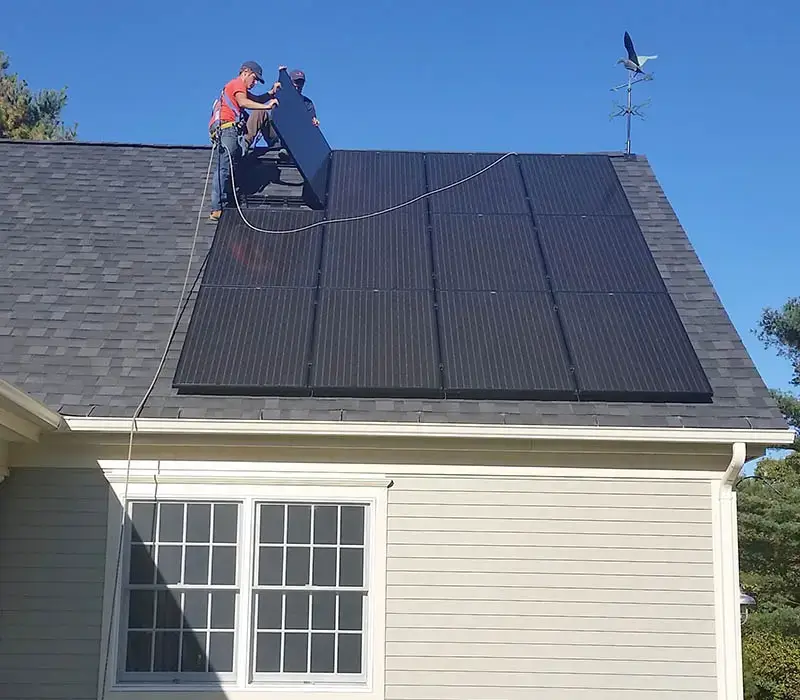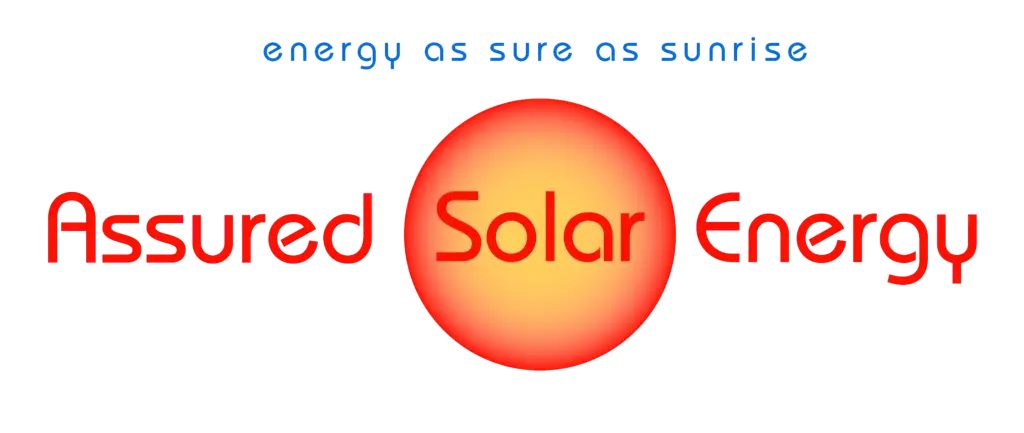Now offering a 30-year equipment and labor warranty. Call us at 207-221-2916 for details!
FAQs
Secure Your 30% Clean Energy Tax Credit Before It’s Gone! Call us at 207-221-2916 for details.
How does a Solar Electric System work?
Solar electric systems use photovoltaic (PV) solar panels to convert the sun’s rays into electricity. The word “photovoltaic” comes from the Greek “photo”, which means light, and the word “volt”, which is a unit of electrical force. When sunlight strikes the PV panel, the panel starts to produce electricity. The electricity travels through specially installed wires to a piece of equipment called an inverter. The inverter then feeds the electrical energy into your main circuit breaker panel, where it is distributed to the rest of the house. In a grid-tied system, any electricity that is not immediately needed by the house is pushed onto the electrical grid, unless the system also utilizes battery storage.
How will a Solar Energy System affect the value of my home?
A growing body of research confirms that installing a solar energy system increases home value by 3-4%. The Lawrence Berkeley National Laboratory (affiliated with the Department of Energy) and Fannie Mae both published rigorous studies confirming this answer in 2016. EnergySage summarizes their findings well. The Lawrence Berkeley National Laboratory analyzed sales of over 20,000 homes in Connecticut, Florida, Massachusetts, Maryland, North Carolina, New York, Pennsylvania, and of course California.
Is Maine a good place for solar?
The Bangor Daily News put it best, “The great thing about solar is it works anywhere. As long as there is sunshine, even with clouds, solar can work. More sunshine (i.e., in California and Arizona) will produce more energy over time, but there are actually some efficiency gains in colder climates because solar panels lose energy in heat. Maine’s solar resource is nearly identical to Massachusetts and Vermont, two states with very active solar industries and programs. In fact, there is more sunshine in Maine than one of the global leaders in solar energy installations – Germany.” Klein, Sharon.
How much does it cost to install a Solar PV System?
Solar electric systems use photovoltaic (PV) solar panels to convert the sun’s rays into electricity. The word “photovoltaic” comes from the Greek “photo”, which means light, and the word “volt”, which is a unit of electrical force. When sunlight strikes the PV panel, the panel starts to produce electricity. The electricity travels through specially installed wires to a piece of equipment called an inverter. The inverter then feeds the electrical energy into your main circuit breaker panel, where it is distributed to the rest of the house. In a grid-tied system, any electricity that is not immediately needed by the house is pushed onto the electrical grid. You receive a credit from the utility company for this excess energy.
What is battery backup?
A solar system with battery backup includes a battery bank to store energy from the solar array. During a power outage, the inverter disconnects from the grid and draws energy from the battery bank; the batteries are recharged by the solar panels during the day.
Will I still have electricity during a power outage?
A grid-tied solar electric system shuts down and does not work during a power outage. This prevents electricity from flowing back into the damaged power grid, where it can injure the linemen who are working to bring the grid back on line. If you would like to have a more robust backup electric system, consider installing a solar system with battery backup. Off-grid systems are sized according to how much electricity you plan to use, and how long you expect to need to rely on the batteries during spells of bad weather.
How does Net Metering work?
Net Metering, also known as Net Energy Billing, is a great incentive offered by Maine’s electrical utility services. If you have a grid-tied system in the state of Maine, the electricity that you produce with solar can be fed back to the grid in exchange for credits in your utility account. For example: if it were a beautiful sunny day and your solar system was producing more electricity than you were currently using in your home, that extra electricity would be pushed back onto the grid. The utility records the amount of electricity being pushed on to the grid in kilowatt hours (kWh). That electricity is recorded and stored as credits in your utility billing account as a one kWh to one kWh ratio. Later that night, when you are not producing electricity with your solar system, you are then able to use electricity from the grid in exchange for those credits that you’ve stored, rather than paying for the electricity directly. For more details on net metering policies, see the following from Central Maine Power: https://www.cmpco.com/suppliersandpartners/servicesandresources/interconnection/net-energy-billing
Off -Grid Systems
Can I go “off the grid”?
If you have a home or camp that is not connected to the electrical grid, we can design and install a solar system to provide electricity for you. A solar system is a great alternative to a generator for off-grid situations: solar energy is quiet, clean, low-maintenance, and never needs refueling. If you already have a grid connection at your home and are interested in using solar to provide power during grid outages, we can provide a grid-tied system with battery backup. Suppose you already have a grid connection at your home and are interested in using solar to provide power during grid outages. In that case, we can provide a grid-tied system with a battery backup.
What is the difference between Grid-Tied and Off-Grid?
A “grid-tied” solar system is connected to the utility power grid, meaning it can send excess electricity back to the grid and draw power from the grid when needed. An “off-grid” solar system is completely independent from the grid and relies solely on battery storage to power your home.
Do you do island work?
Yes! At Assured Solar Energy, we are passionate about preserving the vitality of Maine’s island communities in Casco Bay by increasing the availability of affordable renewable energy. Rob Taisey, our company founder and President, has been working with island energy systems ever since his days growing up off the grid on Bustins Island, Maine. We would love to work with you to achieve your energy goals for your island home, camp, or community. To find out how to get started with your island energy project, you may either use the Contact Page or email us at [email protected].

